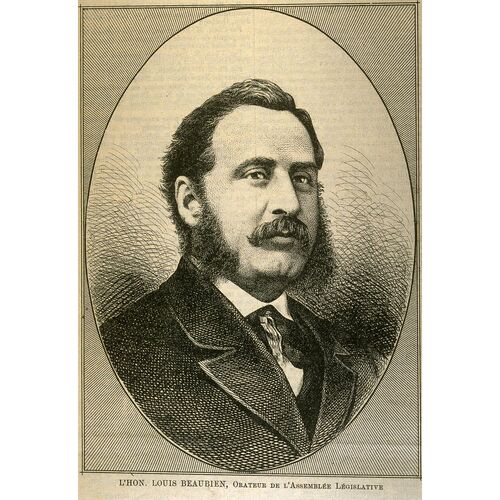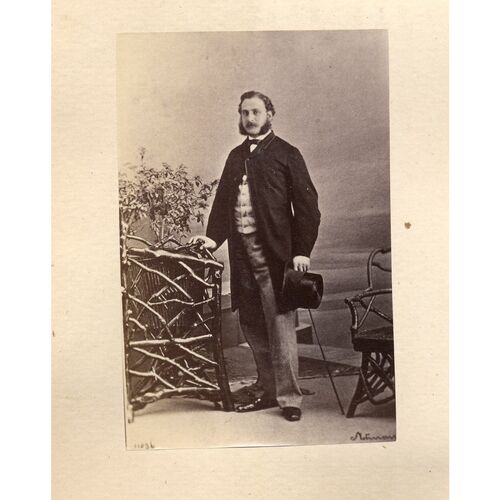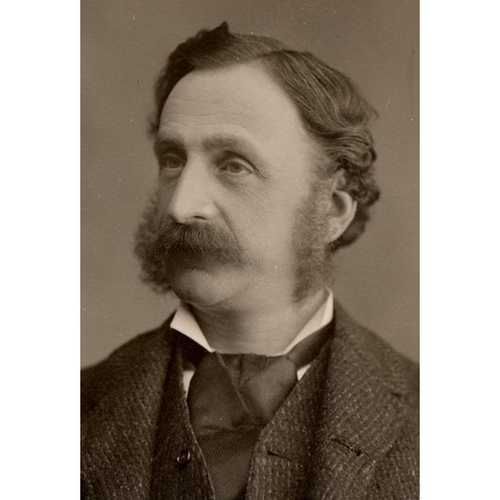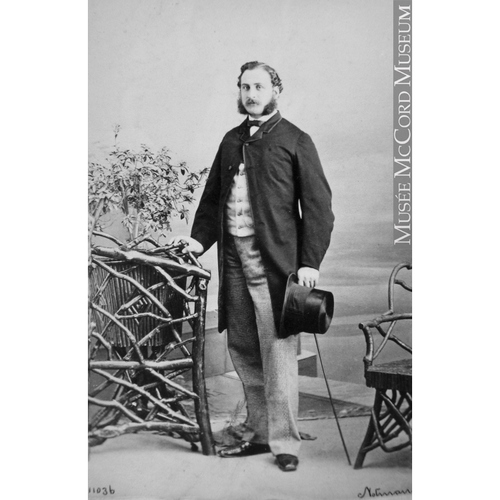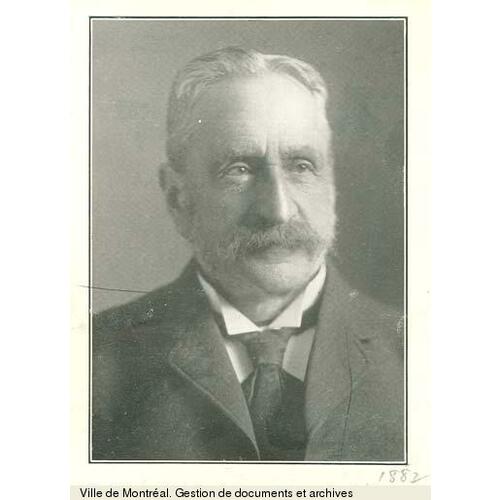BEAUBIEN, LOUIS (baptized Louis-Joseph-Benjamin), journalist, politician, landowner, and businessman; b. 27 July 1837 in Montreal, son of Pierre Beaubien*, a physician and politician, and Marie-Justine Casgrain; m. 31 May 1864, at Quebec, Suzanne Lauretta Stuart, daughter of Andrew Stuart*, a lawyer and subsequently chief justice of the Quebec Superior Court, and Charlotte-Elmire Aubert de Gaspé; they had four sons and four daughters; d. 19 July 1915 in Outremont, Que.
After studying at the Petit Séminaire de Montréal from 1848 to 1856, Louis Beaubien took part in the activities of the Cabinet de Lecture Paroissial, the Institut Canadien-Français, and especially the Union Catholique, of which he would be president in 1859. He was also on the editorial staff of L’Ordre (Montréal), a newspaper founded in November 1858 by Joseph Royal* and Cyrille Boucher*. He undoubtedly shared the political and religious views of his ultramontane friends, but his field would remain almost exclusively economics. His contribution to the newspaper was rather modest. Most of the time he did only the sections headed “Navigation et commerce,” and later “Revue commerciale,” which essentially consisted of a list of market prices. Sometimes he used his pieces to give his fellow citizens a bit of advice. On 22 March 1859 he suggested: “Wherever we see something that may bring prosperity to our country, let us seize it at once. In this respect we should imitate the American genius for taking whatever they need, wherever it may be, adapting it to their own country, and then turning it into a means of becoming well-off.” Beaubien was already interested in agriculture, and wanted to make it more productive and more profitable. He supported colonization as a way of slowing down emigration to the United States and of moving the unemployed from Lower Canadian towns and cities to the countryside. He thought it was not yet time to develop manufacturing, and observed on 13 Sept. 1859: “First we must take possession of the land in its entirety. Once we are masters of it, once we no longer fear being dispossessed by a foreign hand, we will turn our attention to other ways of creating greater prosperity for ourselves.” He was not without ambition, however. On 31 May 1859 he proposed nothing less than the creation of a French Canadian navy! Beaubien’s short journalistic career showed him to be a fervent nationalist, especially in economic matters. On 25 June 1861 he and his ultramontane colleagues resigned from the editorial staff of L’Ordre, which from then on would reflect the views of moderate liberals instead.
In 1866, two years after their marriage, Beaubien and his wife moved to Côte-Sainte-Catherine, where he worked his father’s farm. In 1875 he would be one of the leading founders of Outremont. The family estate was then the largest property in this new town. On his father’s death in 1881, Beaubien would also inherit substantial parcels of land in the east end of Montreal.
With the coming of confederation, Beaubien embarked on a sometimes stormy political career in the Conservative party. From 1867 to 1886 he represented Hochelaga in the Quebec Legislative Assembly. From 1872 to 1874 he sat for the same riding in the House of Commons, but he resigned after the double mandate was abolished. He was the speaker of the provincial house from 10 Nov. 1876 to 1 May 1878.
Beaubien’s interests were agriculture, colonization, and railways. He was a friend and admirer of the curé François-Xavier-Antoine Labelle*, but on occasion did not hesitate to express his differences of opinion. In August 1874, for instance, he wrote to Labelle that he found “quite extraordinary” the determination to insist on “clearing the north, on cutting down the beautiful forests there (which should simply be logged), in order to replace these woods with crops that often freeze before being harvested.” No matter how hard-working the northerners were, he added, the fact remained that “half the time they suffer from hunger and poverty.” It would be better, in his view, to direct colonization towards the Eastern Townships, where the sun was warmer.
Beaubien and Labelle were thick as thieves, however, when it came to combining party politics, railways, and speeches about colonization. The politician wrote to the priest telling him what he should do at election time to ensure the victory of candidates favouring their projects. With Labelle’s support, Beaubien put forward the idea of a wooden railway between Saint-Jérôme and Montreal. In 1869 the Montreal Northern Colonization Railway was founded, and that year it became eligible for subsidies under provincial legislation on colonization railways which Beaubien had helped to get passed.
However, this project, which would eventually connect Montreal and Ottawa, was set in a much broader context than what the ultramontanes called “the national task” of colonization. The company directors were Montreal entrepreneurs, with Hugh Allan* as president and Beaubien, the big landowner, as vice-president from 1870 to 1873. The proposed line would bring the riches of forests and mines from the Ottawa valley to Montreal. The terminus at Hochelaga (Montreal) would increase the value of land in the eastern part of the island and railway construction would provide jobs for the voters. Beaubien also sat on the boards of some other railway companies, most of them connected with Allan. They included the Canada Central Railway, the North Shore Railway, the Montreal Island Railway, and the Ontario and Quebec Railway. For Allan, the railways on the north shore formed a link in a potential transcontinental network and were part of his battle against his competitor, the Grand Trunk. This position was endorsed by Beaubien, who gave political support and French Canadian respectability to Allan’s enterprises, while Allan had no hesitation in financing Beaubien’s election, at least in 1872. The member for Hochelaga proved vigilant in defending Montreal’s interests and made every effort to keep the metropolis as the junction between the Montreal Northern Colonization Railway and the North Shore Railway. In 1872 Beaubien left the board of the North Shore Railway. He later accompanied Allan to England in an endeavour to persuade British capitalists to invest in the Montreal Northern Colonization Railway, but they met with little success. Thus in 1875, despite the infusion of considerable provincial and municipal public money, the company declared itself unable to continue with the project because it was undercapitalized. The provincial government then bought it, along with the North Shore Railway, to create the Quebec, Montreal, Ottawa and Occidental Railway. Although his name had been mentioned, Beaubien was not a member of the commission set up to administer the new public railway. He would return later, however, as vice-chairman of the Laurentian Railway Company.
Meanwhile, Beaubien remained faithful to the same interests and would be very bitter when in 1882 Premier Joseph-Adolphe Chapleau* agreed to sell the eastern section of the Quebec, Montreal, Ottawa and Occidental to a group headed by Louis-Adélard Senécal* rather than to Hugh Allan, Sévère Rivard*, and their associates. He publicly criticized the Conservatives for this sale and in February 1883 voted against his own government. The premier, Joseph-Alfred Mousseau*, immediately reported the incident to Sir John A. Macdonald*, remarking that he would always congratulate himself for not bringing this traitor into his cabinet. Beaubien had, by his stand, antagonized a sizeable section of his party.
Beaubien distinguished himself by his passion for farming even more than by his activities as a railway promoter. From the beginning of his career as an mla he spoke in favour of agricultural progress. He suggested that free land be given to students who had attended an agricultural school for two years. From 1869 to 1886 he was a member of the Council of Agriculture, a consultative body of the provincial government, and he used it to spread information through specialized journals, agricultural societies and exhibitions, and experimental farms. He was also president of the Hochelaga County agricultural society and a member of the Ayrshire Breeders’ Association and the Montreal Horticultural Society. In 1877, after visiting agricultural schools in Lansing, Mich., and Guelph, Ont., Beaubien publicly criticized the schools in Quebec for not attaching sufficient importance to practical instruction and declared himself in favour of having a single school for the entire province. He also suggested giving students a salary in addition to their living allowance. This stand drew a vigorous retort from Abbé Narcisse Proulx, the principal of the school at Sainte-Anne-de-la-Pocatière (La Pocatière), who did not appreciate criticism from the member for Hochelaga. The incident illustrates Beaubien’s boldness and outspokenness; he apparently never hesitated to express his opinion, even at the risk of alienating close associates.
At the time of the Riel affair [see Louis Riel*] Beaubien was again a maverick. Like many of his compatriots, while not justifying the rebellion he none the less deplored the hanging of the Métis “lunatic” and helped organize the famous demonstration of 22 Nov. 1885. At an open-air meeting, he vigorously attacked Chapleau and his confederates. In the spring of 1886 he seconded the motion put forward in the Quebec Legislative Assembly by Pierre Garneau*, a fellow Conservative, to censure the federal government for its actions. He thought French Canadians ought to unite and show that they were “conscious of the insult that has been shown their race.” The motion was defeated by the Conservative majority, but a number of Conservatives would not forget their colleague’s action. When the Liberals in turn moved a vote of censure, this time against the provincial Conservatives, Beaubien stood with his party. Although he was an ultramontane, he had no ties with the followers of François-Xavier-Anselme Trudel*, who at that time was supporting Honoré Mercier*’s Parti National. The election campaign in the summer of 1886 proved difficult. Beaubien had to fight on two fronts: against the Conservatives, who had persuaded a candidate to run against him, and against the Liberals. At a large public meeting on 12 August Beaubien tried to explain his conduct. To the Liberals and National Conservatives who accused him of having acted purely from personal hatred for Chapleau and reproached him for having abandoned his own people by remaining in the party of the “hangmen,” he replied: “Until now I have defended the national cause in my own way. I will continue to do so.” The stormy meeting ended in a brawl. A number of Conservatives held a grudge against him for his temporary desertion and seemed to consider him at best a constant embarrassment to the party and at worst a traitor since 1882. Realizing that his candidacy threatened to work in favour of the Liberal contestant, Beaubien finally withdrew a scant week before election day, 14 Oct. 1886.
Now that he had retired, for a while, from political life, Beaubien devoted his energies to his farm in Outremont. In 1889 he founded the Compagnie du Haras National for the purpose of importing and selling French horses. To improve the breeds in the province, the company also proposed to lease purebred horses to agricultural societies and individuals. It received an annual grant of $6,000 from the provincial government and a like amount from the federal government, but it seems to have suspended operations after 1893.
In 1891 the ultramontane wing of the Conservative party regained power. Premier Charles Boucher de Boucherville recognized Beaubien as both an old friend of the party and a farming enthusiast by offering him the post of commissioner of agriculture and colonization. In 1892 Beaubien was elected mla for Nicolet and he would keep his cabinet office until his defeat in the riding of Beauharnois in 1897. The new commissioner’s policy was based on the principle that farming must be made profitable in order to be attractive. Agricultural knowledge must therefore be disseminated and farmers be persuaded to use the most effective methods. With these objectives in mind, Beaubien gave legal recognition in 1893 to the agricultural circles springing up in every parish and he insisted that these circles be regularly visited by speakers. In 1893 also he helped found the agricultural school in Oka [see Pierre Oger], and he supported the introduction of a course in home economics and horticulture for girls at the school run by the Ursulines of Roberval [see Malvina Gagné].
Beaubien gave strong encouragement to the dairy industry as the path of the future for farmers. In particular, he extolled the advantages of ensilage, which ensured better feed for the herds. As far back as 1886 he had been recommending the construction of silos, emphasizing that they could provide “what men so earnestly pursue, profit.” The silo, which makes it possible to “abolish winter,” was “the farmer’s savings bank,” he declared.
Beaubien often disagreed with the agronomist Édouard-André Barnard*. In 1892, for example, when Barnard was trying hard to organize the Syndicat des Cultivateurs in order to unite the members of the agricultural circles, the commissioner refused to grant government subsidies. He supported instead the Syndicat Central des Agriculteurs du Canada, a rival Montreal organization whose two vice-presidents happened to be his son Joseph* and his son-in-law Raymond-Auzias Turenne. Obviously, Beaubien did not always make a distinction between public and private interests.
Even after his defeat in 1897, Beaubien continued to be active in the Conservative party. In 1899, with other prominent members such as Louis-Joseph Forget, Louis-Olivier Taillon*, Rodolphe Forget, Thomas Chase-Casgrain, and Frederick Debartzch Monk, he founded a daily newspaper, Le Journal, to give the Montreal Conservatives a voice after La Minerve went out of circulation. Beaubien was vice-president of the management board and president of the Compagnie d’Imprimerie Électrique, which was responsible for publishing Le Journal. The paper ceased publication in March 1905 and this event seems to have marked the end also of Beaubien’s political career.
Beaubien was, of course, a member of such Conservative social organizations as the Garrison Club of Quebec, the Club Lafontaine, and the Montreal Club, but he belonged to various other associations as well. He had served as a captain in the Chasseurs Canadiens, and he was president of the Association Saint-Jean-Baptiste de Montréal in 1882. He also belonged to the Montreal Business Men’s League and the Chambre de Commerce du District de Montréal, sitting on its council in 1889. Finally, he was very active in the Montreal League for the Prevention of Tuberculosis, set up in 1902.
In addition, Beaubien was on the board of directors of the Banque Provinciale du Canada, which had been founded in 1900 after the Banque Jacques-Cartier declared bankruptcy [see Alphonse Desjardins (1841–1912)]. During the same period he was a promoter of the Yukon Loan and Trust Company and president of the Montreal Park and Island Railway Company, a streetcar venture that served suburban Montreal and would be absorbed in 1901 by the Montreal Street Railway Company.
At the time of his death Louis Beaubien was considered one of the largest landowners on the island of Montreal and one of the richest French Canadians of his generation. His life provides proof, if any is needed, that in the 19th century it was possible to be a convinced ultramontane without disregarding material and economic matters.
Louis Beaubien published a number of addresses and speeches, the most important of which are Le chemin de fer: nos communications avec l’Ouest; discours ([Québec?, 1875?]); Étude sur l’éducation agricole; lue devant le Conseil d’agriculture de la province de Québec, le 8 mars 1877 (Montréal, 1877); Le silo et le pâturage; conférence de l’honorable Louis Beaubien à Saint-Hyacinthe, le 13 janvier 1886 (s.l., [1886?]); Conférence de l’honorable monsieur L. S. Beaubien, prononcée à L’Assomption, lors de la réunion annuelle des membres de la Société laitière de la province de Québec ([Montréal?, 1889?]); Discours prononcé à la séance du 3 juin 1892 de l’Assemblée législative de la province de Québec (s.l., 1892); Discours de l’hon. M. Beaubien à l’inauguration de l’école d’industrie laitière de Saint-Hyacinthe, le 11 mars 1893 (s.l., [1893?]); and Discours de l’honorable L. Beaubien, commissaire de l’Agriculture et de la Colonisation, prononcé à l’Assemblée législative le 26 novembre 1893 (Montréal, 1894). With Raymond Auzias-Turenne, he also prepared the introduction to the 1889–90 catalogue of the Compagnie du Haras National, Vente et affermage de chevaux percherons, arabes et carossiers normands . . . ([Montréal], 1889). Additional publications by Beaubien have been microfilmed by the CIHM and are listed in its Reg.
ANQ-Q, P-124-1. NA, MG 27, I, E35; MG 30, D1, 3: 642–48. Gazette (Montreal), 20 July 1915. La Minerve, avril–octobre 1886. L’Ordre, union catholique (Montréal), 23 nov. 1858–10 juill. 1861. La Presse, avril–octobre 1886. C.-P. Beaubien, Écrin d’amour familial, détails historiques; au sujet d’une famille, comme il y en avait tant d’autres au Canada qui devraient avoir leur histoire (Montréal, 1914). Firmin Létourneau, Histoire de l’agriculture (Canada français) (Montréal, 1959). M.-A. Perron, Un grand éducateur agricole: Édouard-A. Barnard, 1835–1898; étude historique sur l’agriculture de 1760 à 1900 ([Montréal]; 1955). RPQ. Standard dict. of Canadian biog. (Roberts and Tunnell). B. J. Young, Promoters and politicians: the northshore railways in the history of Quebec, 1854–85 (Toronto, 1978).
Cite This Article
Fernande Roy, “BEAUBIEN, LOUIS (baptized Louis-Joseph-Benjamin),” in Dictionary of Canadian Biography, vol. 14, University of Toronto/Université Laval, 2003–, accessed April 1, 2025, https://www.biographi.ca/en/bio/beaubien_louis_14E.html.
The citation above shows the format for footnotes and endnotes according to the Chicago manual of style (16th edition). Information to be used in other citation formats:
| Permalink: | https://www.biographi.ca/en/bio/beaubien_louis_14E.html |
| Author of Article: | Fernande Roy |
| Title of Article: | BEAUBIEN, LOUIS (baptized Louis-Joseph-Benjamin) |
| Publication Name: | Dictionary of Canadian Biography, vol. 14 |
| Publisher: | University of Toronto/Université Laval |
| Year of revision: | 1998 |
| Access Date: | April 1, 2025 |


![L'Hon. Louis Beaubien, orateur de l'Assemblée Législative [image fixe] Original title: L'Hon. Louis Beaubien, orateur de l'Assemblée Législative [image fixe]](/bioimages/w600.6548.jpg)
